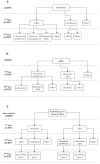Optimal Sequencing and Predictive Biomarkers in Patients with Advanced Prostate Cancer
- PMID: 34572748
- PMCID: PMC8467385
- DOI: 10.3390/cancers13184522
Optimal Sequencing and Predictive Biomarkers in Patients with Advanced Prostate Cancer
Abstract
The treatment landscape of advanced prostate cancer has completely changed during the last decades. Chemotherapy (docetaxel, cabazitaxel), androgen-receptor signaling inhibitors (ARSi) (abiraterone acetate, enzalutamide), and radium-223 have revolutionized the management of metastatic castration-resistant prostate cancer (mCRPC). Lutetium-177-PSMA-617 is also going to become another treatment option for these patients. In addition, docetaxel, abiraterone acetate, apalutamide, enzalutamide, and radiotherapy to primary tumor have demonstrated the ability to significantly prolong the survival of patients with metastatic hormone-sensitive prostate cancer (mHSPC). Finally, apalutamide, enzalutamide, and darolutamide have recently provided impactful data in patients with nonmetastatic castration-resistant disease (nmCRPC). However, which is the best treatment sequence for patients with advanced prostate cancer? This comprehensive review aims at discussing the available literature data to identify the optimal sequencing approaches in patients with prostate cancer at different disease stages. Our work also highlights the potential impact of predictive biomarkers in treatment sequencing and exploring the role of specific agents (i.e., olaparib, rucaparib, talazoparib, niraparib, and ipatasertib) in biomarker-selected populations of patients with prostate cancer (i.e., those harboring alterations in DNA damage and response genes or PTEN).
Keywords: LuPSMA; PARP inhibitors; androgen-receptor signaling inhibitors; chemotherapy; ipatasertib; metastatic castration-resistant prostate cancer; metastatic hormone-naïve prostate cancer; metastatic hormone-sensitive prostate cancer; nonmetastatic castration-resistant prostate cancer.
Conflict of interest statement
C.C.: expenses from Novartis, Pfizer, Janssen and Ipsen; advisory board from Janssen. M.B.: research funding by Roche S.p.A., Seqirus UK, Pfizer, Novartis, BMS, Astra Zeneca, and Sanofi Genzyme; honoraria as a speaker at scientific events by Bristol-Myers Squibb (BMS), Novartis, Astra Zeneca, Pierre Fabre, and Pfizer; fees as a consultant for advisory role by Novartis, BMS, IPSEN, and Pfizer; fees for copyright transfer by Sciclone Pharmaceuticals. E.C.: honoraria from Astellas Pharma, AstraZeneca, Bayer, Janssen-Cilag, and Pfizer; consulting or advisory role from Astellas Pharma, Astra Zeneca, Bayer, Janssen, and Merk; research funding from AstraZeneca (Inst), Bayer (Inst), and Janssen (Inst); travel, accommodations, expenses from Astellas Pharma, Astra Zeneca, Bayer, Janssen, and Roche. D.O.: honoraria from Astellas Pharma (Inst), Bayer, and Janssen; consulting or advisory role from AstraZeneca (Inst), Bayer, Bayer (Inst), Clovis Oncology, Janssen, and Janssen (Inst); research funding from Astellas Medivation (Inst), AstraZeneca (Inst), Bayer (Inst), Genentech/Roche (Inst), Janssen (Inst), Pfizer (Inst), and Tokai Pharmaceuticals (Inst); travel, accommodations, expenses from Astellas Pharma, Bayer, Ipsen, and Janssen. D.L.: advisory fees from Sanofi, speaker fees from Janssen, Astellas, Bayer, Sanofi, Pfizer, and BMS, and travel expenses from Janssen and Astellas. A.G.: consulting/advisory role for Roche, MSD, Eli Lilly, Pierre Fabre, EISAI, Daichii Sankyo, Speakers Bureau Eisai, Novartis, Eli Lilly, Roche, Teva, Gentili, Pfizer, Astra Zeneca, Celgene, and Daichii Sankyo; research funds from EISAI, Eli Lilly, and Roche. The other authors have no conflicts of interest to declare.
Figures

References
-
- Kyriakopoulos C.E., Chen Y.-H., Carducci M.A., Liu G., Jarrard D.F., Hahn N.M., Shevrin D.H., Dreicer R., Hussain M., Eisenberger M., et al. Chemohormonal Therapy in Metastatic Hormone-Sensitive Prostate Cancer: Long-Term Survival Analysis of the Randomized Phase III E3805 CHAARTED Trial. J. Clin. Oncol. 2018;36:1080–1087. doi: 10.1200/JCO.2017.75.3657. - DOI - PMC - PubMed
-
- Clarke N., Ali A., Ingleby F., Hoyle A., Amos C., Attard G., Brawley C., Calvert J., Chowdhury S., Cook A., et al. Addition of docetaxel to hormonal therapy in low- and high-burden metastatic hormone sensitive prostate cancer: Long-term survival results from the STAMPEDE trial. Ann. Oncol. 2019;30:1992–2003. doi: 10.1093/annonc/mdz396. - DOI - PMC - PubMed
-
- Fizazi K., Tran N., Fein L., Matsubara N., Rodriguez-Antolin A., Alekseev B.Y., Özgüroglu M., Ye D., Feyerabend S., Protheroe A., et al. Abiraterone acetate plus prednisone in patients with newly diagnosed high-risk metastatic castration-sensitive prostate cancer (LATITUDE): Final overall survival analysis of a randomised, double-blind, phase 3 trial. Lancet Oncol. 2019;20:686–700. doi: 10.1016/S1470-2045(19)30082-8. - DOI - PubMed
-
- James N., Rush H., Clarke N., Attard G., Cook A., Dearnaley D., Gillessen S., Hoyle A., Jones R., Millman R., et al. 611O Abiraterone acetate plus prednisolone for hormone-naïve prostate cancer (PCa): Long-term results from metastatic (M1) patients in the STAMPEDE randomised trial (NCT00268476) Ann. Oncol. 2020;31:S509. doi: 10.1016/j.annonc.2020.08.871. - DOI
Publication types
LinkOut - more resources
Full Text Sources
Research Materials
Miscellaneous

